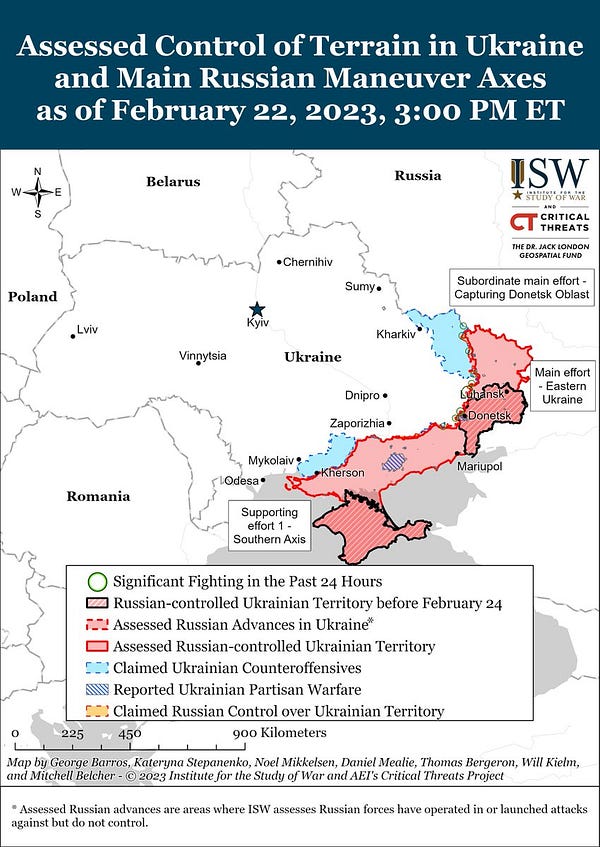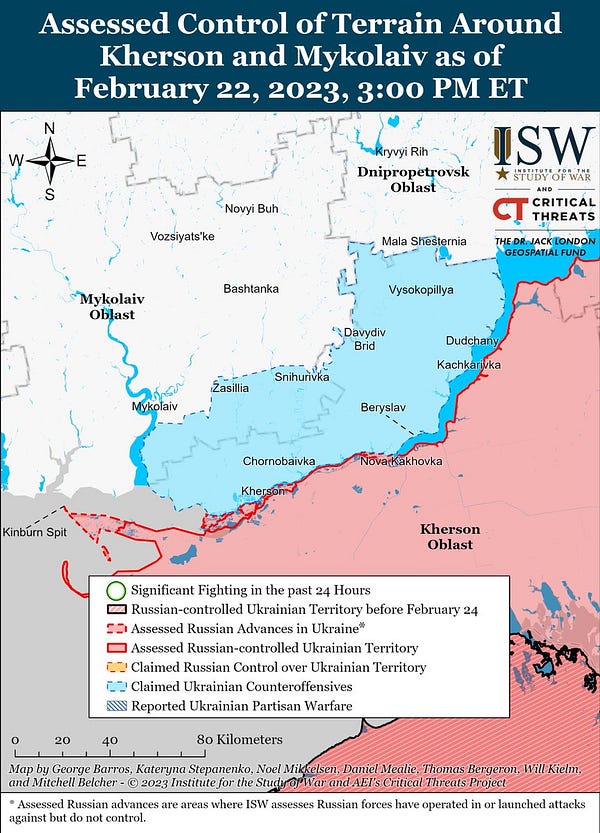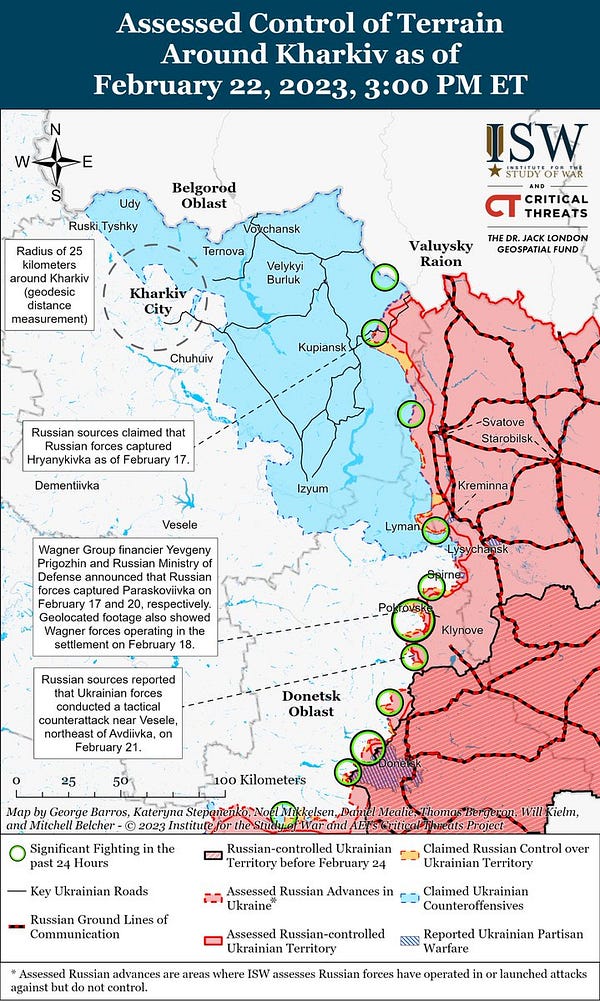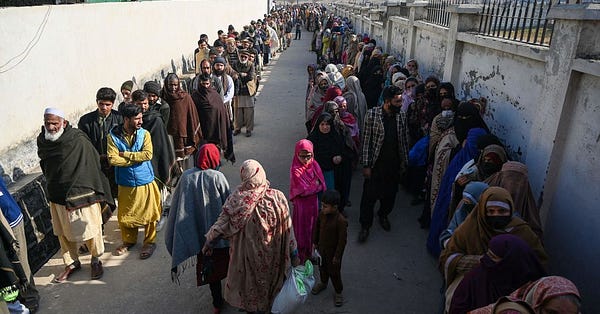Feb 23: Buonasera Mag
Day 364: Zelensky Vuhledar Kyiv Mariupol Moldova China Nauseda Biden EU Sanchez Orban UK RUcyber India-A&Ps-ISW mLiubakova USAID LiberiOltre Horowitz Cepa Kelkar Brzezinski LITHMfa Ash LedByDonkeys
Catching up…
EA Worldview’s Ukraine Up-date- hop over to Scott’s amazing hourly Ukraine up-date page. I’ll fill in with some bits and bobs.
Stories we’re following…
General Staff: Ukraine repels near 90 Russian attacks over past day. The Ukrainian military reported repelling 90 Russian attacks over the past 24 hours in northeastern and eastern Ukraine, the General Staff of Ukraine's Armed Forces wrote in its morning update. The attacks were near Kupiansk (eastern Kharkiv Oblast), located not far from Luhansk Oblast, and Lyman, Bakhmut, Adviika, and Shakhtarsk in Donetsk Oblast, where, according to the General Staff, Russia is concentrating its main offensive efforts.





The town of Vuhledar, in southern Donetsk oblast, has experienced heavy shelling again, according to the MoD’s latest defence intelligence update. (see below)
A loud explosion sounded in the western part of Kyiv, as reported by a Kyiv Independent journalist. Air raid alert was turned on minutes before the explosion.
Explosions reported in Mariupol. Two explosions were heard in Russian-occupied Mariupol on the evening of Feb. 22, Mariupol City Council reported via Telegram.
Moldova denies Russian claim of planned provocation against Transnistria, urges calm. Russia alleged on Feb. 23 that Ukraine was planning to attack the Moldovan region of Transnistria, which hosts 1,500 Russian troops and a large Soviet-era arms depot.
China’s top diplomat, Wang Yi, has met Vladimir Putin in Moscow, as China and Russia reaffirm their close bilateral relationship just days before the first anniversary of the start of the Ukraine war. Wang told Vladimir Putin that Beijing will play a “constructive” role in reaching a political settlement of the crisis in Ukraine, Russian state-owned Tass news agency reported.
WSJ: US contemplates intel release on China’s potential arms transfer to Russia. The Biden administration is considering releasing intelligence it believes shows that China is examing possibilities on whether to supply weapons to support Russia’s war in Ukraine.

Biden vowed that the US will defend “literally every inch of Nato” territory ahead of talks with Nato’s secretary general Jens Stoltenberg and leaders of the Bucharest Nine (B9), a collection of nations on the most eastern parts of the Nato alliance and closest to Russia. The alliance includes Bulgaria, the Czech Republic, Estonia, Hungary, Latvia, Lithuania, Poland, Romania and Slovakia.
President Nausėda, said he urged Joe Biden to seek Nato deployment of additional military equipment, including Himars artillery or attack helicopters, in the Baltic states, during the US president’s meeting with B9 leaders. He said Biden was silent but took notes as he listened to Nausėda and others on deploying air defence systems in the Baltics and other eastern flank countries.
President Sandu said Russia was “waging hybrid war against Moldova” including through “propaganda and disinformation” alongside “multiple cyberattacks” and “multiple false bomb alerts.” These actions are intended to undermine social cohesion, provoke protests and allow external saboteurs to launch a coup, she said.
EU countries have failed to agree on a new set of sanctions against Russia meant to be in place for the one-year anniversary of Moscow’s invasion of Ukraine on Friday, four diplomatic sources in Brussels have told Reuters. More talks among Brussels representatives of EU member countries were due on Thursday afternoon, said the sources.

Spain to give 6 Leopard 2 tanks to Ukraine. Spanish Defense Minister Margarita Robles confirmed that Spain would transfer six renovated Leopard 2 A4 main battle tanks to Ukraine, reports El Pais. Robles added that the goal is to have the tanks in Ukraine by the end of March or early April.
Over a dozen EU countries on Wednesday led a pushback against a Commission proposal for penalties to enforce reporting obligations on Russian assets. The plan was to fine institutions and individuals if they failed to report on the whereabouts of Russian state assets, but the pushback from EU capitals forced the Commission to drop it, as POLITICO reported. The proposal was part of the EU’s 10th sanctions package against the Kremlin, but countries including Austria, Germany, Belgium, the Czech Republic, France, Italy, Latvia, Malta and Portugal argued they needed more time to assess the technical details.
“We will have to do something to prevent circumvention,” he said. “Because it is not enough to proclaim sanctions, we have to implement them — and that requires imposing a lot of discipline on a lot of people” to avoid funds being moved to a different account or exporters taking different routes.


A group of 10 EU member states have called for stronger action to stop Russia sourcing military parts through front companies in neighbouring countries and evading western sanctions. The 10 countries, which include France, Germany, Italy and the Baltic states, write that “2023 must be the year of success in countering circumvention”, warning that public support and international legitimacy of sanctions could wane if they are deemed ineffective.
Nato must “seriously plan” for the likely future reality of a Russian-controlled Belarus, the US-based thinktank the Institute for the Study of War (ISW) has warned. Putin will “very likely secure significant gains in restoring Russian suzerainty over Belarus” and use it as a launch pad to further threaten Ukraine and Nato’s eastern flank, regardless of the outcome of his invasion of Ukraine, the ISW said in its latest update on the war.
Zelensky plans to attend July NATO summit in Vilnius. President Volodymyr Zelensky plans to attend the July NATO summit in Vilnius in person, Petro Beshta, the ambassador to Lithuania, told BNS. According to Beshta, Ukraine hopes attendees at the summit will agree "that as soon as the war is over, Ukraine becomes a member of NATO."


Politico: "Putin’s closest EU ally holds up package: Hungary’s Viktor Orbán is again threatening to veto the extension of EU sanctions — which have to be renewed every six months — because he wants four individuals removed from the list."
In a first, Finland’s defense ministry has blocked an attempt by Russian citizens to buy property in the Nordic state on national security grounds. The authorities’ problem with the transaction was a simple one: the building was a stone’s throw from the Niinisalo Garrison, an army training center for troops assigned to national defense and overseas operations.
Britain has begun to “warm up” its production lines to replace weapons sent to Ukraine and increase production of artillery shells to try to help Kyiv push back Russian forces, defence minister Ben Wallace has said.
Many of Russia’s cyber operations against Ukraine and NATO members during the past year have not yet become public knowledge, according to a joint report published this week by two Dutch intelligence services. The joint report from the Dutch General Intelligence and Security Service (AIVD), alongside its Military Intelligence and Security Service (MIVD), cites two reasons why “many of these attempts have not yet become public knowledge.”
The joint report relays the findings of the intelligence agencies — collected through “sensitive operations using human and technical resources” — about the threat posed by the Russian state conducting cyberattacks on various institutions, physical sabotage on maritime infrastructure, and information operations.
In January, China’s National Bureau of Statistics made it official: After decades of fabulous GDP growth, the rate is now down to 3%. The culprit is Xi Jinping’s “zero-COVID” policy, plus ruptured supply chains and soaring energy prices. In the post-lockdown recovery, growth will of course bounce back, but not into the enduring double-digit rates prevailing since the 1980s, when China became the envy of the world.
India does not want the G20 nations to discuss additional sanctions on Russia during its one-year presidency of the bloc, according to officials. On Tuesday, Japan’s finance minister said financial leaders of the G7 nations would meet tomorrow, on the sidelines of the G20 gathering in India, to discuss measures against Russia.
International Federation of Journalists suspends Russian Union of Journalists Suspension follows RUJ's establishment of branches in occupied regions of Ukraine.
Ex-infrastructure minister charged with abuse of power in corruption case. Ukraine's Specialized Anti-Corruption Prosecutor's Office on Feb. 22 charged ex-Infrastructure Minister Andriy Pyvovarsky and his deputy of abuse of power.


LiberiOltre in piazzas across Italy…
LiberiOltre has organised demonstrations in piazzas across Italy to stand with Ukraine. “There is no peace without the withdrawal of Russian troops from Ukraine, there is no West without support for the invaded people, there is no freedom without resistance to defend it.”
LiberiOltre will also be broadcasting a “Support for Ukraine Marathon” on their YouTube channel. Please do tune in.

If you are in Italy and would like information about a rally in your area, please DM me or LiberiOltre.
Michael Horowitz, Ukraine: The Coming Offensives- CEPA
Over the past months, the war in Ukraine has narrowed down to several key points, mostly in the eastern oblasts. The conflict hasn’t become any less intense but has become a bloody stalemate. One of the main battles currently being fought around the eastern city of Bakhmut is reminiscent of the battle of Verdun in France in 1916: a long, deadly, and cruel battle in which each contested square kilometer is won or lost at an enormous cost in lives. This may be the bloodiest battle since the beginning of Putin’s war against Ukraine.
But this stalemate won’t last. Both sides are preparing for a much-anticipated set of spring offensives and counter-offensives. On the Russian side, it’s clear that the Kremlin is laying the groundwork for a renewed push, although the nature, scale, and goal of the offensive remain unclear. The recent leadership change at the very top of the Russian military, with the appointment of General Valery Gerasimov as the head of Russian forces in Ukraine, suggests Moscow wants to once again roll the dice on another offensive. As we’re fast approaching the second year of what was supposed to be (in Vladimir Putin’s mind) a short military campaign, Gerasimov’s appointment hints at frustrations of Russian leaders. By appointing one of his “star” generals as the head of Russian forces in Ukraine, Putin likely hopes to break the stalemate. Ukrainian intelligence has also been warning that such an offensive was coming, suggesting it may start in the coming weeks, if not days.
Zbigniew Brzezinski, Post-Communist Nationalism, Foreign Affairs
The time has come for the West to confront as a policy issue a problem that for years most Western scholars have tended to ignore and that all Western policymakers still consider to be taboo: the rising tide of nationalism in Eastern Europe and especially in the Soviet Union itself. This long-dormant issue is now becoming, in a dynamic and conflictual fashion, the central reality of the once seemingly homogeneous Soviet world. Indeed, whereas Marx once described the tsarist Russian empire as the prison of nations, and Stalin turned it into the graveyard of nations, under Gorbachev the Soviet empire is rapidly becoming the volcano of nations.
Until recently, the West preferred to downplay the reality of East European national aspirations and to downgrade the implications of non-Russian national awareness within the Soviet Union. Moreover, most Westerners perceived the Soviet Union as identical with Russia and assumed almost automatically that any Soviet citizen was a Russian. This has now changed. National conflicts have ruptured the illusion of communist brotherhood and the mirage of some sort of supra-ethnic Soviet nationhood. Henceforth, the ongoing crisis of communism within the once homogeneous Soviet bloc is likely to define itself through increased national assertiveness and even rising national turmoil. In fact, there is a high probability that the progressing self-emancipation of the East European nations and the growing sense of national distinctiveness among the non-Russian nations of the Soviet "Union" will soon make the existing Soviet bloc the arena for the globe's most acute national conflicts.

Timothy Ash, Punishing the Poor — China’s Debt Imperialism- CEPA
In the era of the commodity super cycle, China’s model appeared a no-brainer. Low-income countries typically had assets in demand by China — commodities in the case of Ghana or Zambia, or deep-water ports in the case of Pakistan or Sri Lanka. But they lacked the financial resources to develop these assets. China had the cash in the form of a huge foreign exchange reserve buffer, it had the technology and know-how to fast-track infrastructure development to bring emerging market commodities to their market in China.
It was China’s strategic priority to access key commodities and the ports and infrastructure to deliver them to its industry. As a result, numerous low-income countries took multibillion-dollar loans from Chinese banks and state-owned enterprises in the hope of fast tracking their development. The numbers are enormous — according to a 2020 report, China has lent $1.5 trillion to 150 countries, and in the process become the world’s largest official creditor. Interest rates charged on these loans were often set at commercial, rather than concessionary rates, but the assumption was that growth would step up a gear making future repayment easy.
In case you missed it…
Ambassador Mikko Hautala explains how Finland can help ensure Ukraine's path to victory.










